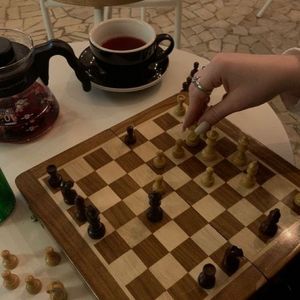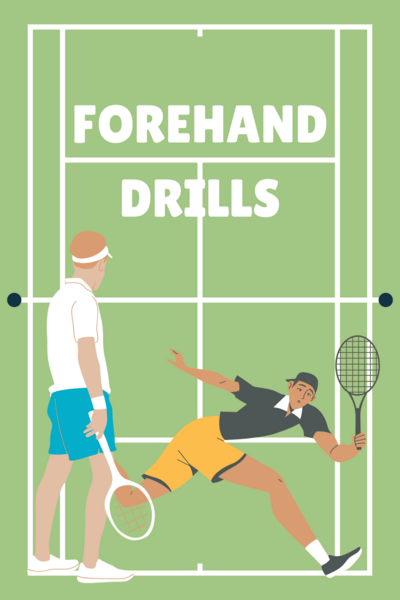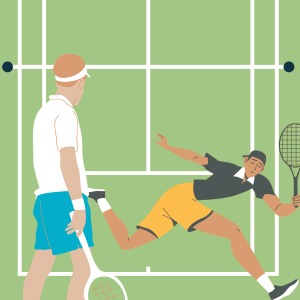2019
Viktor Ivanov has not had two weeks to cool down in his retirement before the Netflix documentary comes out. Julian recognises the ghost of a vast PR machine behind it and finds it just slightly tasteless. He knows he’s in the film too, he has signed the release forms, which is only one of the reasons he has avoided it for so long. He finally hunkers down to watch it on a particularly underwhelming Friday night when it’s pissing down with rain outside.
He pours himself a glass of Malbec and props his right foot up on the coffee table, rubbing his knee absentmindedly through the fabric of his joggers. The first part of the film underscores various people’s recollections of Viktor’s childhood with archive footage from what was still the Soviet Union at the time. Children at school, children playing chess, children playing tennis with adult-sized racquets much too big for them.
Finally, Viktor himself appears on screen, dark and sturdy like a brick wall, and the way the interviewer has to extract his recollections like pulling teeth contrasts so comically with the nature of this piece of media that Julian can’t help but laugh. Scenes from the nineties follow, gritty and grainy and with pops of primary colours, and it follows the evolution of Viktor’s monster forehand, his rocket of a serve across various courts around the world.
The aesthetic changes to the awkwardness of the noughties, in their slightly sharper glory, and the narrative turns to Viktor’s rivalries. Julian feels flattered that they chose to include him, even though he only ever stood a chance against Viktor on grass. On all other surfaces, he was trailing behind Ivanov and Thiago Navarro by quite a bit, to the point of embarrassment. Still, the timestamp "2008" appears on the screen and Julian is about to witness the match point of his own first Wimbledon win on his flat-screen TV. He sees himself fall to his knees and bury his face in the patchy grass, like a monk at prayer, dressed in white. His 24-year-old self then lifts the trophy. He was handsome here, he thinks, all cheekbones and clear eyes and a mess of blond hair. Too bad it has all gone to shit.
2011 now, another Wimbledon final against Viktor, and Julian takes this easily, in 3 sets. He lifts his hand and his racquet towards the sky and smiles. The camera pans to Julian’s box and rests on Elena’s figure dressed in a 60s-style white minidress, the waves of her black hair cascading down her shoulders, something about her presence not unlike Jackie Kennedy. They weren’t married yet here, but they would be by Christmas.
Julian reaches for the wine and checks his phone, and misses the big “2015” flashing on the screen. When he looks up, he recognises the Cincinnati court a split second too late, so he doesn’t have time to scramble for the remote and fast forward anymore. Instead, he is forced to watch himself in the past as he stumbles on a return, falls to the floor and rolls to his side clutching his knee, his face contorted in pain.
“Shit,” he hisses in the present, and his fingers grab at his knee unconsciously, even though it hasn’t hurt in earnest in a while. “Christ,” he winces, and fast forwards anyway, to the section about the rise of young Thiago Navarro, Viktor’s one true rival. The documentary insists on their deep respect for each other, the narrative almost paints them as a pair of star-crossed lovers instead of what they really were, which is, as Julian knows full well and first-hand, two people who couldn’t stand each other.
Cut to 2019. The movie ends with the very recent footage of Viktor’s retirement ceremony at the US Open, his favourite slam that he won 7 times, a record in the Open era. The footage shows everyone at the ceremony sobbing, except Viktor himself, who stands tall and unmoving with his hands clasped in front of him, face devoid of any expression.
“What a fucking drivel,” Julian snorts as the credits roll. He refills his glass and starts a Tarantino film, which he promptly falls asleep to, right on the sofa.
It’s already morning when he wakes in a panic, sombre grey light filtering through his blinds. He tries to take some deep breaths against the frantic pounding of his heart and then checks his phone for the time.
“Jesus.” He rubs his face with one hand, his stubble rough under the heel of his palm. Two missed calls from Luca. What could he want at this hour? Still, it might be nice to talk to someone.
When Elena left, a year after the injury, six months after it became clear Julian would never play tennis again, she took most of the friend group with her. And not just the actors, the musicians, the showbiz people, but the tennis players too. Luca Romano was one of the few who stayed — despite everything, he attached himself to both of them, like a child who just couldn’t be sure that the divorce was not his fault.
Julian puts the kettle on and waits for the water to boil before calling Luca back.
“Julian,” Luca shouts into the phone, elongating the first syllable. Could not be more Italian if he tried, Julian thinks.
“Mate. What’s going on?”
“How have you been?” Luca asks, and Julian senses some ulterior motive between the cheerfully enunciated words.
“Quite shit,” Julian replies simply and honestly. “Saw the Ivanov film last night.” He pauses a moment, then decides to change the subject immediately. “You?”
Luca takes a thoughtful pause. “I’m sorry, mate.” The mate sounds foreign on his tongue, he had picked it up from Julian. “I think I have something to cheer you up. Would you come to Sicily next weekend? To the academy?”
Since Luca retired a few years before Julian, he’s been pouring all his love and money into a little cluster of clay courts just outside Taormina. Julian has visited him there before, but something about the urgency of this request strikes him as odd.
“Next weekend?” Julian furrows his brow and blows into his tea before taking a sip. “Why?”
“I want to show you something,” Luca says and pauses. “It’s really important. How do they say, I’ll make it worth your while.”
Julian stays silent, so Luca proceeds to pull out all the stops.
“If you really don’t want to come,” he says, “then do it as a favour to me.”
Julian closes his eyes and pinches the bridge of his nose. “Which day should I buy the ticket for?” he asks.











Comments (0)
See all